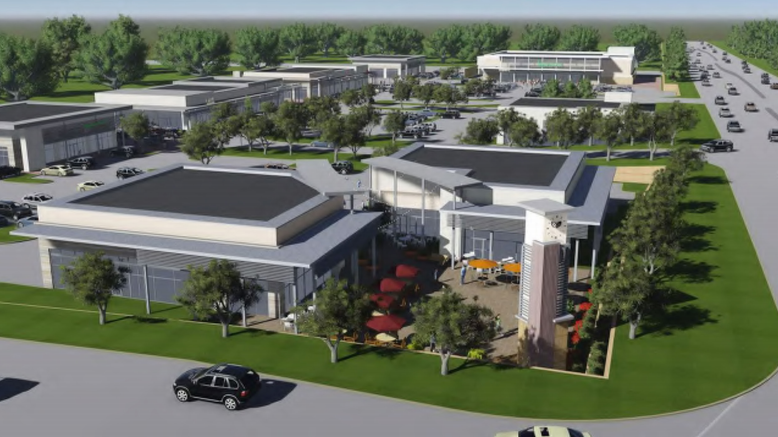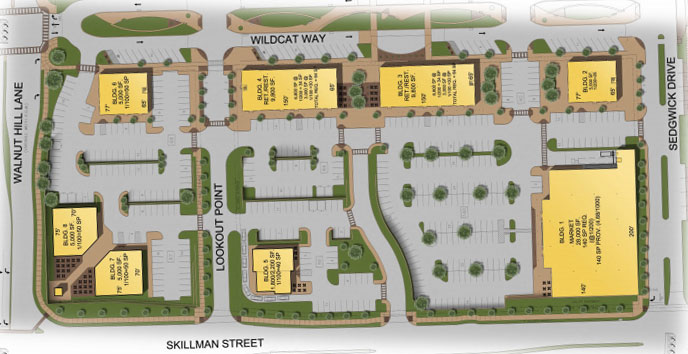
Lake Highlands Town Center rendering based on developer Cypress Equities’ plans
The City of Dallas and developers seem at a stalemate regarding the Lake Highlands Town Center’s design. Might our new mediation-savvy councilman help things along?
Mixed-use. Transit-oriented. Dense. Vertical. Urban. Since the idea of a Lake Highlands town center was proposed a decade ago, this jargon has been used to describe the future development.
The City of Dallas wants town center developer Cypress Equities to make good on this vision, considering that the city and other government entities already have invested $24 million in the project. Cypress argues, however, that the commercial real estate market isn’t compatible with the city’s demands.
The two sides are at a stalemate.
And neighbors, who have watched the 70-acre Skillman-Walnut Hill project languish for 10 years, find themselves somewhere between exasperated and resigned to whatever may (or may not) come.
The fact that urban planners use an elitist vocabulary is unfortunate, says Kevin Sloan, an architect who co-chairs the city’s Urban Design Peer Review Panel, because it keeps residents from feeling like they can engage in the conversation.
“Urbanism is somewhat hard to understand at a verbal level,” Sloan says, but whether or not neighbors know the terminology, “when they see it, they know whether it’s right or wrong.”
[quote align=”right” color=”#000000″]“Urbanism is somewhat hard to understand at a verbal level … when they see it, they know whether it’s right or wrong.”[/quote]“A real urban building is like a puzzle piece,” he continues. “You put it in, and all of a sudden, you understand the rest of the puzzle.“Our cities are an incomplete puzzle, and we are all city builders. Every building makes or unmakes the city.”
That last sentence is a mantra that adorns Sloan’s office. He takes this into consideration when developers’ projects come to the panel of architects and urban planners for review, usually because they are seeking millions of city tax dollars as part of their financing. And in return, Sloan believes, we the taxpayers should expect projects that don’t just benefit the city economically but also benefit our quality of life.
In the case of the Lake Highlands Town Center, the city’s Urban Design Peer Review Panel took issue with the “suburban character” of Cypress Equities’ proposal.
“There’s nothing close to urban about this project,” Sloan says. “It wasn’t designed with the end first, which is you, the person. If you don’t begin with the end, you’re gonna get what you’re gonna get.”

Cypress Equities’ plan for the Lake Highlands Town Center submitted to the Urban Design Peer Review Panel
Urbanity doesn’t necessarily mean density, a reference to how many people live in a certain area. Density in cities often takes the form of apartment complexes, condominium developments, even duplexes or zero-lot homes.
Most Americans yearn for a more low-density urbanism, Sloan says, like the kind evident in a French town or English garden village — “all of the essential pieces and parts of urbanism are there,” he says, “not in multiples but in singles and doubles, where you can get to know all the people in your environment.
“Lake Highlands wants to be low-density, but it still wants a physical center, that if there was a reason to congregate, there’s a place we would all go to congregate.”
The town center project’s Wildcat Way, an interior street running parallel to Skillman, is a natural parade route or strolling avenue, for example. Already, when events such as Oktoberfest or the Art and Play Festival use the town center property, Wildcat Way is the main drag, so to speak.
But if buildings are arranged around a pond of parking with their backs to that street, as they are in Cypress’ plan, it loses that feel, Sloan says. The panel suggested leaving the property along Wildcat Way vacant for now, and rather than spreading out buildings, concentrating the retail “in a way that makes a space and a place, then the parking field can be used as deferred investment,” Sloan says.
The panel also decried the project’s skinny sidewalks, not even wide enough for two people to stroll side-by-side. It’s a “low level problem that gets in the way of things happening correctly,” Sloan says. “Sidewalks shouldn’t create confrontation.”
In urban design, sidewalks should be not only wide and inviting but should run between streets and storefronts, not parking lots. The panel would like to see “a more continuous retail edge” along both Skillman and Walnut Hill, with parking toward the center that, again, could give way to future development.
Ultimately, the panel conveyed its belief that “the short term realities of retail leasing should not precede the attainment of the long-term vision of a true town center development.” With $24 million in tax dollars invested, another $38 million hanging in the balance, and both sides refusing to budge, that’s where the town center stands.
A few days before the June runoff election, Lake Highlands Councilman-elect Adam McGough said he hopes to draw on his training in conflict management and mediation, and try to find middle ground “somewhere between” the original urban vision and a suburban shopping center.
“This is a negotiation,” McGough says, and there is “tension and emotion.”
[quote align=”right” color=”#000000″]“What the community is asking is, ‘What will this place have to offer us?’ That’s a very profound question.”[/quote]He says one of his first orders of business will be to host a meeting with the stakeholders, including City Design Studio, the peer review panel, Cypress, community leaders and interested citizens.“Communities need to trust their intuition,” Sloan says. “Be articulate. Say what you see. Architecture does not have a Hippocratic oath of ‘do no harm,’ and fortunately or unfortunately, we live in an economy that can benefit from some pretty big mistakes.”
One of the problems with America in general and Texas in particular, Sloan says, is viewing land through the lens of extraction — take the oil out of the ground, plant the cotton in the field.
It shouldn’t be about “speculation, short-term gain, ‘here is what this place can do now,’ ” Sloan says. “City making is about investment, where what you build is directly related to the qualities of what it has to offer.
“What the community is asking is, ‘What will this place have to offer us?’ That’s a very profound question, and it’s different than saying, ‘Well, it’s better than the nothing that’s there.’ ”
Additional reporting by Sam Gillespie
Read regular reports about progress at the Lake Highlands Town Center and an analysis of the recent District 10 City Council election at lakehighlands.advocatemag.com. Suggested search terms: Cypress, McGough





